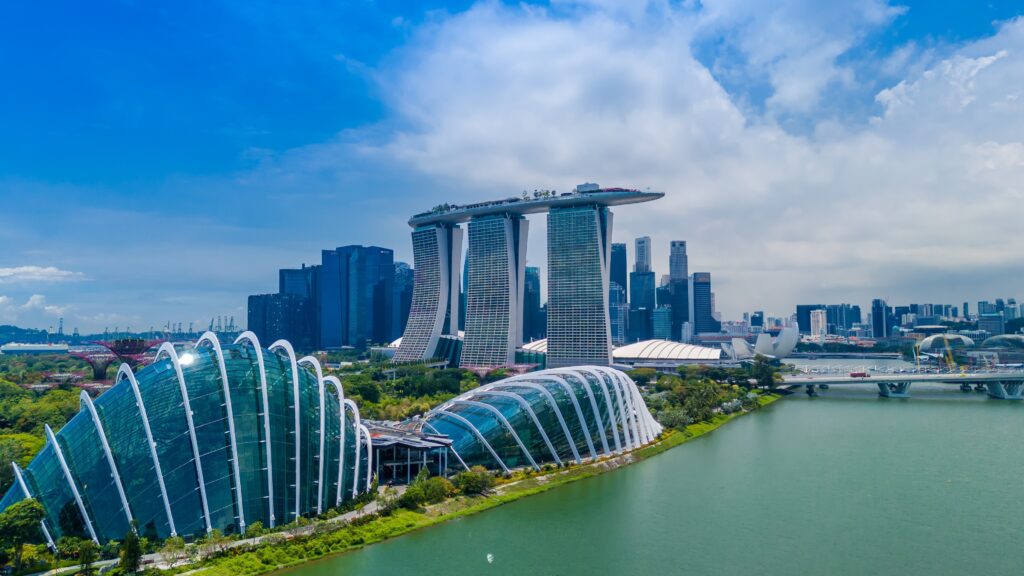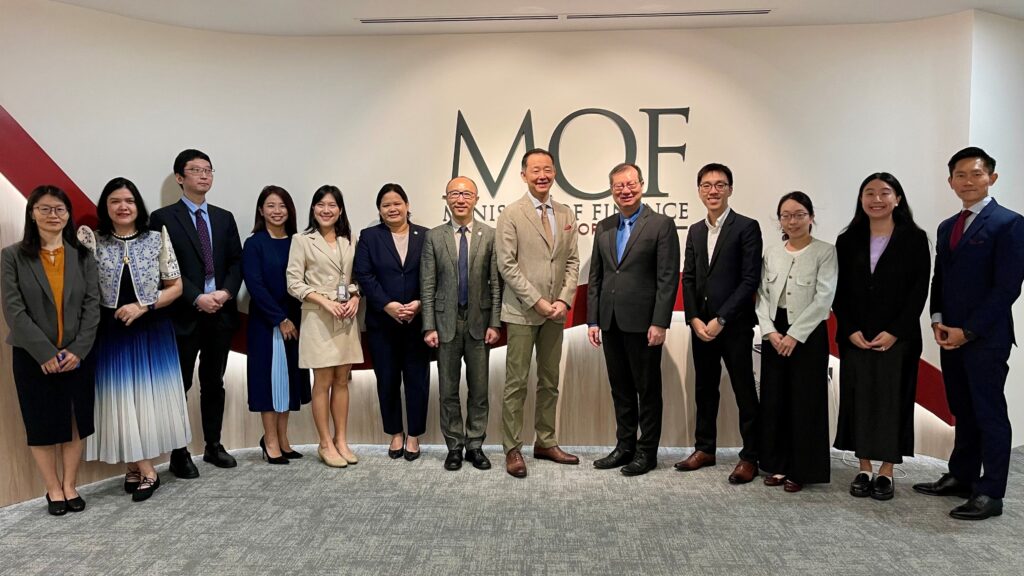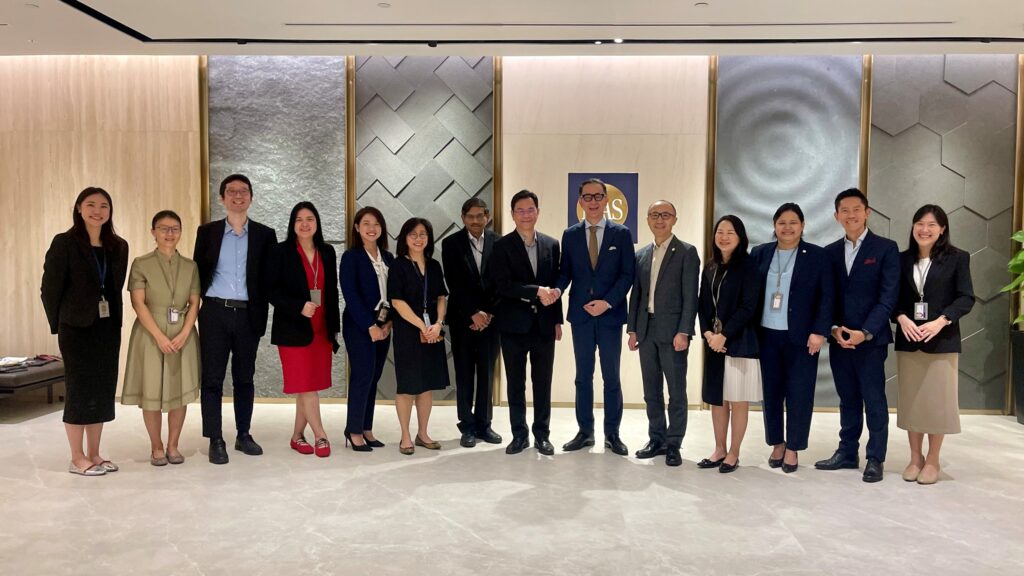
SINGAPORE, September 11, 2025 – Singapore’s economy is expected to moderate following a robust performance in 2024 and the first half of 2025, as the impact of US tariffs starts to take hold. Inflation has eased and is expected to remain low. Amid external challenges from trade disruptions and persistent capital inflows, a skillful mix of fiscal, monetary, and macroprudential policies will be essential to cushion near-term impacts. Concurrently, addressing structural challenges and championing regional integration will enhance Singapore’s economic resilience over the medium term.
This preliminary assessment was made by the ASEAN+3 Macroeconomic Research Office (AMRO) during its Annual Consultation Visit to Singapore from August 11 to September 5, 2025.
The mission team was led by Lead Economist Runchana Pongsaparn, with AMRO Director Yasuto Watanabe and Chief Economist Dong He participating in key policy meetings. Discussions focused on the challenges from the shifting global trade and financial landscapes, and policy options to mitigate the disruptions and futureproof the Singapore economy.
Economic developments and outlook
“Growth is projected to moderate to 2.6 percent in 2025 and 2.0 percent in 2026. While Singapore faces a lower tariff rate from the US compared to other countries in the region, the global trade slowdown and associated uncertainties will weigh on the economy, given its high trade openness,” said Dr. Pongsaparn. “Weaker external demand will dampen export-related sectors, with spillovers to domestic investment and consumption.”
Inflation is expected to moderate to 0.9 percent this year, supported by well-coordinated policy measures, softening domestic demand, and lower import prices.
Singapore is in a strong position to navigate economic uncertainties. The external position remains robust, and the banking sector is sound, with strong asset quality and capital buffer, ample liquidity, and solid profitability.
AMRO projects the fiscal balance to be 1.4 percent of GDP in FY2024 and 1.3 percent in FY2025, which provides room for further support to cushion potential shocks. The Monetary Authority of Singapore eased monetary policy in the first half of the year by reducing the slope of the S$NEER appreciation path, in response to softer inflation and growth outlook. At the same time, persistent capital inflows have lowered domestic interest rates, contributing to easing financial conditions.
Risks, vulnerabilities, and challenges
The near-term growth outlook is clouded by external risks. Uncertainties from US protectionist trade measures, particularly the possibility of higher tariffs on pharmaceutical and semiconductor products, could weigh on the economy. Slower growth among key trading partners, particularly China and the US, poses further downside risk. On the financial side, persistent safe-haven inflows due to Singapore’s strong fundamentals could complicate the conduct of exchange rate-based monetary policy.
Over the longer term, sustained geoeconomic tensions may require Singapore to reshape its role as a regional trade and financial hub. Aging demographics will also weigh on potential growth, raise the old-age dependency ratio, and heighten fiscal pressures. Cybersecurity risks remain a common concern for international financial centers with advanced technology adoption.
Policy recommendations
Well-coordinated fiscal, monetary and macroprudential policies will be vital to weather external shocks. Fiscal support should be targeted and time-bound, such as commendable initiatives like the Business Adaptation Grant announced by the Singapore Economic Resilience Taskforce (SERT). Special transfers should be targeted to vulnerable households, while the existing broad-based transfers should be phased out gradually as cost-of-living pressures ease.
With core inflation projected to remain low and growth momentum expected to moderate, an easier stance of monetary policy is appropriate though any adjustment to the policy stance should be data dependent. Meanwhile, tight macroprudential measures should be maintained to mitigate risks of overheating in the property market and a rapid debt build-up among households amid a more accommodative interest rate environment.
In parallel, policy efforts should focus on strengthening Singapore’s competitiveness through supporting business adoption of automation and workforce reskilling. Enhancing the attractiveness of the domestic equity market and promoting financial innovation will reinforce Singapore’s standing as a global financial hub.
Singapore is well placed to drive regional integration. Its joint efforts with Malaysia to collaborate on the Johor-Singapore Special Economic Zone could offer a potential blueprint for deeper ASEAN integration. Separately, its initiatives on regional digital payments and financial market infrastructure connectivity are advancing financial linkages. With notable progress in climate change adaptation and mitigation, Singapore is poised to lead regional climate governance and collaboration.
The AMRO team sincerely appreciates the Singapore authorities and counterparts for their close cooperation and candid and insightful discussions during the mission.
About AMRO
The ASEAN+3 Macroeconomic Research Office (AMRO) is an international organization established to contribute toward securing macroeconomic and financial resilience and stability of the ASEAN+3 region, comprising 10 members of the Association of Southeast Asian Nations (ASEAN) and China; Hong Kong, China; Japan; and Korea. AMRO’s mandate is to conduct macroeconomic surveillance, support regional financial arrangements, and provide technical assistance to the members. In addition, AMRO also serves as a regional knowledge hub and provides support to ASEAN+3 financial cooperation.

AMRO Director Yasuto Watanabe, Chief Economist Dong He, and the mission team met with Deputy Secretary (Planning) of Singapore’s Ministry of Finance Kevin Shum and other senior officials.

AMRO Director Yasuto Watanabe, Chief Economist Dong He, and the mission team met with Managing Director of the Monetary Authority of Singapore Chia Der Jiun and other senior officials.
